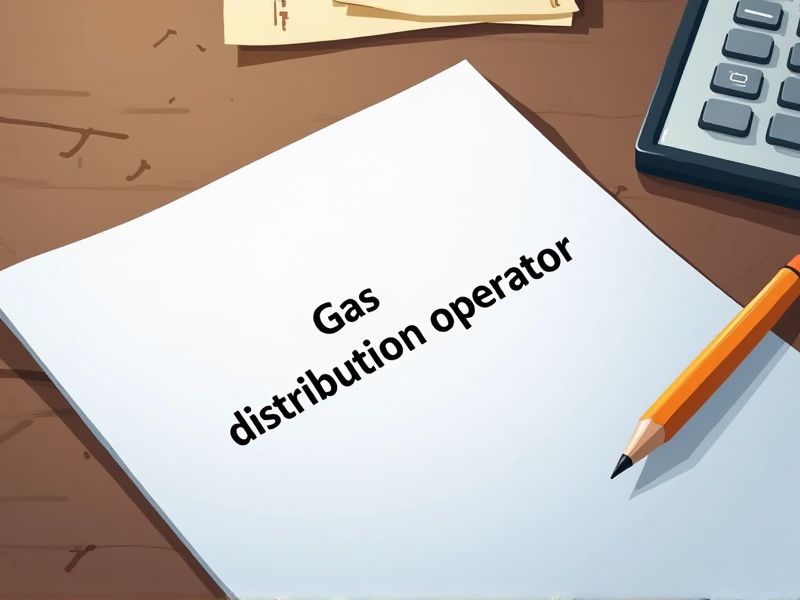
Gas distribution operators manage the safe and efficient delivery of natural gas, a process that involves inherent risks if not carefully controlled. Certification ensures that operators have been trained to handle equipment, monitor systems, and respond effectively to emergencies. Regulatory bodies often require certifications to guarantee compliance with safety and environmental standards. Below are key certifications essential for a Gas distribution operator.
Gas Distribution Safety Certification
Gas Distribution Safety Certification is essential because it ensures operators adhere to industry standards, reducing the likelihood of accidents. Proper certification verifies that operators understand necessary safety protocols, enhancing overall operational safety. Without certification, gas distribution systems may be prone to leaks or failures, leading to potential hazards for communities. Certification also reassures regulatory authorities and the public that operators are competent in managing gas systems safely.
Pipeline Operations and Integrity Certification
Pipeline Operations and Integrity Certification ensures the safe and efficient transport of gas, minimizing the risk of leaks and hazardous incidents. This certification provides gas distribution operators with the necessary framework to maintain compliance with regulatory standards. High-quality pipeline integrity management reduces operational downtime and maintenance costs by identifying potential issues before they escalate. Certified operators demonstrate a commitment to safety and sustainability, which can enhance public trust and investor confidence in their operations.
OSHA 30-Hour General Industry Safety Certification
OSHA 30-Hour General Industry Safety Certification focuses on enhancing workplace safety awareness, essential for gas distribution operators who handle potentially hazardous materials. Understanding comprehensive safety protocols reduces the risk of accidents and ensures compliance with legal safety standards. A certified operator is equipped with the knowledge to implement preventive measures, safeguarding both the personnel and infrastructure. Training reinforces a culture of safety, which is critical in an industry with high stakes associated with gas leaks and operational malfunctions.
Confined Space Entry Certification
Gas distribution operators often work in environments prone to hazardous conditions like toxic gases or limited oxygen, which necessitates confined space entry certification to ensure their safety. Certification equips operators with necessary skills to identify potential dangers and employ proper safety protocols. Regulatory compliance, such as OSHA standards, mandates certification to reduce workplace incidents related to confined spaces. The certification process also fosters a culture of safety by emphasizing the importance of preparedness and ongoing education.
Hazardous Materials (HAZMAT) Awareness and Handling Certification
Gas distribution operators handle materials that can pose significant risks to public safety and the environment. By acquiring HAZMAT Awareness and Handling Certification, operators are equipped with the necessary skills to recognize and appropriately manage these hazardous materials. This certification enhances their ability to prevent incidents like leaks or spills, reducing the potential for catastrophic events. Regulatory compliance is maintained, as many jurisdictions mandate such certifications to ensure public and personnel safety.
Lockout/Tagout (LOTO) Safety Certification
Lockout/Tagout (LOTO) Safety Certification is crucial for gas distribution operators because it ensures that machinery and equipment are properly shut off and cannot be started up again before maintenance or repair work is completed. This reduces the risk of accidental releases of hazardous gases, which can pose significant safety threats to workers and the surrounding community. LOTO certification also promotes compliance with Occupational Safety and Health Administration (OSHA) regulations, minimizing legal and financial liabilities for the operating company. Proper implementation of LOTO procedures enhances workplace safety culture and protects both personnel and infrastructure from potential health hazards and operational disruptions.
Emergency Response and First Aid Certification
Gas distribution operators often work in environments where gas leaks can occur, leading to potential health and safety risks. Certification in emergency response and first aid equips them with essential skills to manage incidents, reducing the risk of accidents becoming fatal. Such training ensures operators can apply immediate corrective measures, which helps minimize property damage and safeguard communities. In cases of an emergency, certified operators can promptly assist injured colleagues, fostering a safer work environment.
NFPA Fire Protection and Gas Safety Certification
Gas distribution operators need NFPA Fire Protection and Gas Safety Certification to ensure adherence to industry standards, minimizing the risk of fires and explosions caused by gas mishandling. This certification verifies that operators are knowledgeable about proper safety protocols and emergency response procedures, enhancing operational safety and compliance. Having certified employees reduces the likelihood of incidents that can lead to costly damages and severe legal consequences. Regulators and stakeholders often require such certification to maintain trust and demonstrate a commitment to safety and professionalism.
Environmental Compliance Certification
Environmental compliance certification for a gas distribution operator ensures adherence to regulations that protect air and water quality, minimizing harmful emissions. Certification helps avoid legal penalties and potential shutdowns due to non-compliance, safeguarding the operator's financial stability. Meeting certification standards demonstrates a commitment to sustainability, boosting the operator's reputation and customer trust. Certification can also drive operational efficiencies by encouraging practices that reduce waste and optimize resource use.
Industrial Control Systems (ICS) Safety Certification
Industrial Control Systems (ICS) Safety Certification is crucial for gas distribution operators as it ensures adherence to safety protocols, minimizing the risk of hazardous incidents. Certification validates the operator's ability to detect and respond to cyber threats, safeguarding critical infrastructure from attacks. Compliance with ICS safety standards aids in maintaining efficient and reliable gas distribution, reducing potential downtime. By certifying operators, regulatory bodies can standardize practices, ensuring public trust and confidence in gas distribution services.
Summary
When you obtain certifications for a Gas Distribution Operator, your confidence in their credibility and reliability increases significantly. Certifications often lead to more rigorous safety standards being implemented, reducing the likelihood of accidents. As a result of these enhanced standards, you can expect more consistent and efficient gas distribution services. Your peace of mind grows knowing that certified operators are held accountable to industry best practices.
